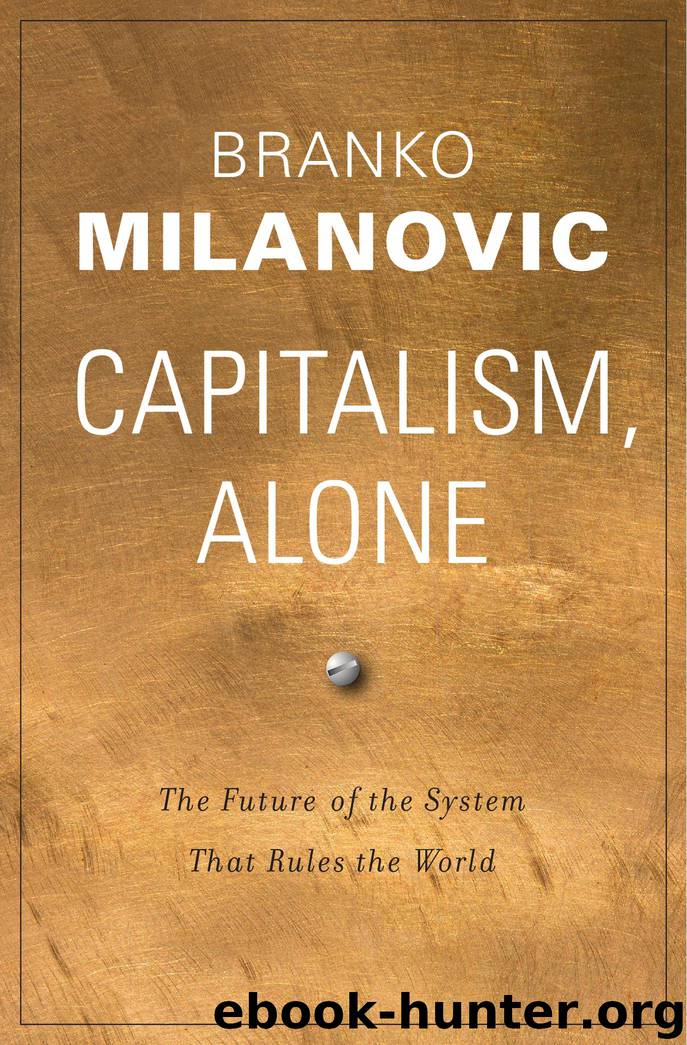Capitalism, Alone: The Future of the System That Rules the World by Branko Milanovic

Author:Branko Milanovic
Language: eng
Format: epub
Tags: Business & Economics, Free Enterprise & Capitalism, Political Science, Political Ideologies, Capitalism, international, Economics
Publisher: Harvard University Press
Published: 2019-09-24T00:00:00+00:00
Today, in what Baldwin identifies as the second unbundling (and the second globalization), all three main actors have changed. Now, the control and coordination of production is done “here,” but the actual production of goods is done “there.” Notice the difference: first you unbundle production and consumption, then you unbundle the production itself.13 The unbundling of production was made possible by the ICT revolution, which allowed companies to design and control processes from the center while spreading the production to hundreds of units or to subcontractors dispersed around the world. The reduced cost of transporting information (basically, the ability to coordinate and control regardless of distance) is for the second unbundling what the reduced cost of shipping was for the first. Now, the main players are (i) information and control (instead of goods), (ii) global coercive institutions (instead of colonialism), and (iii) companies (instead of nations).
A couple of other things are distinctive about the second unbundling. First, the importance of institutions has increased. When globalization involved only the export of goods, institutions in the country to which the goods were exported did not matter much; whether institutions “there” were good or bad, exporters were paid about the same.14 This is not the case with the second unbundling. When production is delocalized, the quality of the institutions, infrastructure, and politics in the recipient country matters enormously to the center. If designs are stolen, goods are impounded, or the travel of people between the center and the offshore location is made difficult, the entire production structure of the company collapses. For the center, the quality of institutions in the offshore location becomes almost as important as the quality of institutions locally. This means that institutions in the periphery now either have to hew as closely as possible to the institutions that exist in the center or to be as integrated as possible, which is exactly the opposite of what the dependencia school taught.
Second, technological progress in the offshore locations now has an entirely different hue than in the past. Whereas in the past developing countries had to try hard to induce foreign investors to share their know-how, now a company based in the center (the mother company) has incentives to make sure the best technology is used in the offshore location, which has become an integral part of the center’s production chain. This is an enormous change: rather than poor countries trying to incentivize foreign companies to transfer technology, now the owner of that technology is keen to transfer to the offshore location as much of it as possible.
The tables, in some sense, have turned: it is now the nation where the mother company is located that tries to prevent the company from transferring its best technology to the periphery. Innovation rents, received by the leaders in new technologies, are being dissipated away from the center. This is one of the key reasons why people in the rich world often complain about outsourcing (or offshoring). They criticize it not only because domestic
Download
This site does not store any files on its server. We only index and link to content provided by other sites. Please contact the content providers to delete copyright contents if any and email us, we'll remove relevant links or contents immediately.
| Elections & Political Process | Ideologies & Doctrines |
| International & World Politics | Political Science |
| Public Affairs & Policy | Specific Topics |
| United States |
The Secret History by Donna Tartt(19052)
The Social Justice Warrior Handbook by Lisa De Pasquale(12187)
Thirteen Reasons Why by Jay Asher(8893)
This Is How You Lose Her by Junot Diaz(6877)
Weapons of Math Destruction by Cathy O'Neil(6264)
Zero to One by Peter Thiel(5786)
Beartown by Fredrik Backman(5737)
The Myth of the Strong Leader by Archie Brown(5499)
The Fire Next Time by James Baldwin(5431)
How Democracies Die by Steven Levitsky & Daniel Ziblatt(5215)
Promise Me, Dad by Joe Biden(5141)
Stone's Rules by Roger Stone(5081)
A Higher Loyalty: Truth, Lies, and Leadership by James Comey(4954)
100 Deadly Skills by Clint Emerson(4921)
Rise and Kill First by Ronen Bergman(4779)
Secrecy World by Jake Bernstein(4741)
The David Icke Guide to the Global Conspiracy (and how to end it) by David Icke(4706)
The Farm by Tom Rob Smith(4502)
The Doomsday Machine by Daniel Ellsberg(4484)
